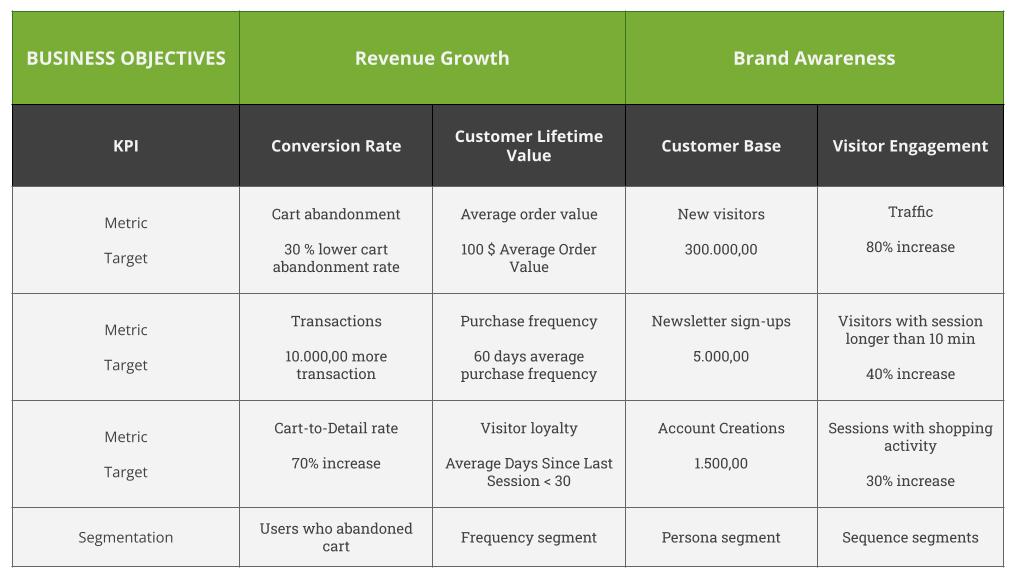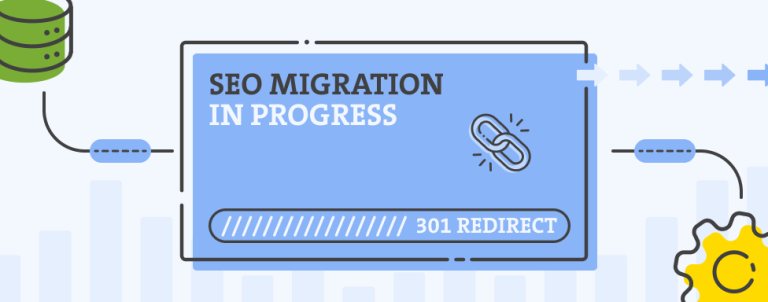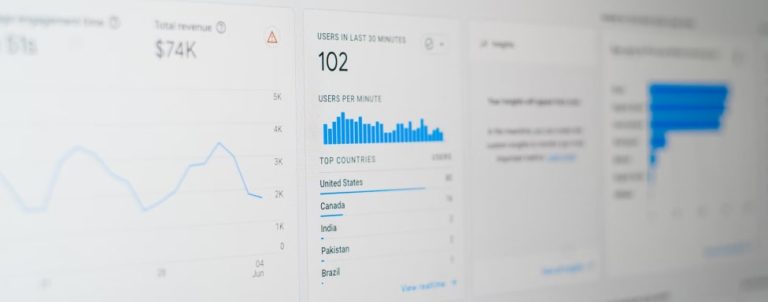Big data has revolutionized the way businesses work. One of the biggest advantages of online stores is the ability to track anything customers do. You can even track what customers almost do at your store. A recent Forrester survey shows that 70% of data decision-makers gather data faster than they can analyze and use it. Still, 67% constantly need more data. This trend will likely accelerate in the years ahead. As a decision-maker, it can be pretty daunting trying to make sense of all that data. Most important thing is to create proper data infrastructure – starting with a measurement plan, but what is a measurement plan?
A measurement plan is a quantifiable way to define your webshop’s success contained in one document or dashboard. A measurement plan contains important metrics and shows what data needs to be collected. In our experience, these 4 reasons are the most emphasized benefits you will have when implementing a measurement plan.
- Alignment of your marketing team
- Filter big data down to tailored metrics for your eCommerce goals
- Transform data into actionable insights – make good decisions
- Improvement of important eCommerce metrics
Alignment of your marketing team
Focus on aspects of your eCommerce store that will deliver the most impact. This is the foundation of a good measurement plan. That’s why deciding on business goals is the first step in creating a measurement plan. End result will be a single point of truth for the entire team and all marketing efforts directed towards the same goals.
Organize a kick-off meeting and get your marketing specialists together to clearly communicate what you want to achieve in the next period. Afterward, they should work closely with data analysts to select KPIs they can improve in order to achieve set goals.
There is no better alignment than including your team in deciding how to reach your targets. You should trust them with this task, they are experts in their fields after all.
Filter big data down to tailored metrics for your eCommerce goals
There are many options when selecting the right metrics and this is where the power of the measurement plan comes in. Once KPIs have been set it’s time to do an analysis and discover the most impactful metrics for reaching set goals.
Segmentation is key here. Properly segmented audiences and their behaviors will allow you to decide which metrics will make the most impact in your situation. Here is an example of how a measurement plan might look in the end.

Finalizing the measurement plan includes setting tracking codes and creating an automated dashboard. You should cut down on data noise from different platforms down to one tailored dashboard. Have a measurement plan as starting dashboard and add pages that cover more in-depth metrics from various different platforms.
Those platforms are designed for professionals to do detailed analysis and you shouldn’t have to navigate through all of them in order to check site performance.
Transform data into actionable insights – make good decisions
By now you’ll have set goals that you want to achieve, segments that you should focus on, and specific metrics that need improvement in order to hit your targets. Your team understands your business and they should be included in all previous steps. You want them to use the measurement plan dashboard as a guide on what is happening.
It will direct them on where to focus their time and effort. An automated dashboard with all important metrics and targets will enable transformation into data-driven decision-making. It also greatly improves the speed at which decisions are made.
As an example, if your business is in a highly competitive industry and you’re running paid promotions. One of the metrics that should be included is “top of the page rank”.
Your PPC team should do the most they can in order to stay on top. Improving ad quality or discovering long-tail keywords, maybe even recommending product page improvements, their recommendation will depend on budget.
Improvement of important eCommerce metrics
We saved the best for last, even though it implies itself. Data-driven and fast optimization of your webshop or marketing efforts will generate the results you desire for your business.
Increase your Revenue? Lowering marketing costs? Increasing customer loyalty? Improving conversion rate? What gets measured – gets done. This may be an overused phrase but it’s accurate when your team understands your goals and executes to achieve them.
So which group of data users does you belong to? In a group with too much or not enough data? Do you have an adequate amount of data but aren’t sure if data is guiding you in the right direction?
In either case, the answer to your problems is taking the first step toward data-driven business – creating a measurement plan. Once implemented, you’ll be able to sift through massive amounts of data quickly and provide relevant insights so people can take meaningful action.
Creating a measurement plan is a required step while providing Magento eCommerce Advanced Analytics services, see how we can help you get started!



